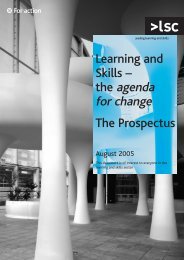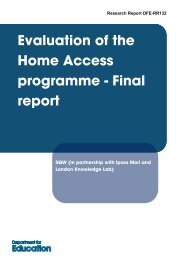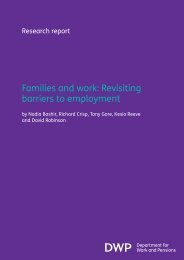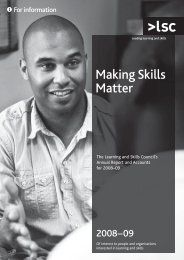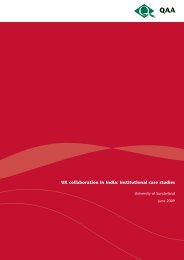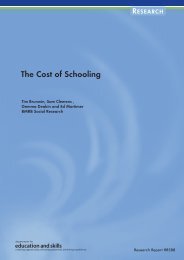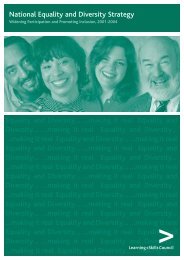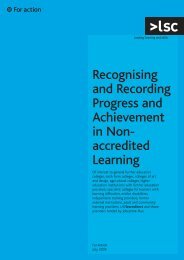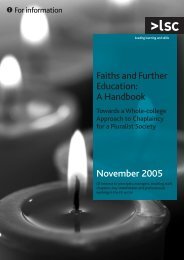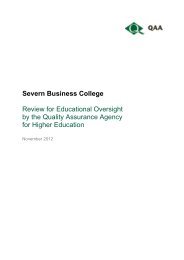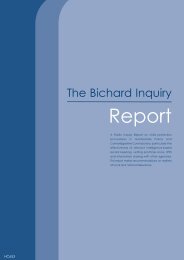The Learning and Skills Councils Annual Report and Accounts for ...
The Learning and Skills Councils Annual Report and Accounts for ...
The Learning and Skills Councils Annual Report and Accounts for ...
Create successful ePaper yourself
Turn your PDF publications into a flip-book with our unique Google optimized e-Paper software.
We have had in place a comprehensive<br />
approach to equality impact<br />
assessment, completing initial<br />
screenings of over 100 business<br />
policies, including HR policies. We have<br />
published full assessments on several<br />
of our key programme policy areas.<br />
<strong>The</strong> LSC work<strong>for</strong>ce<br />
As part of the Single Equality<br />
Scheme, we set ourselves a number<br />
of work<strong>for</strong>ce equality goals which<br />
have aimed to make our work<strong>for</strong>ce<br />
more representative. We have made<br />
substantial progress, particularly in the<br />
proportional representation of women<br />
in senior roles (b<strong>and</strong>s 4 <strong>and</strong> 5) –<br />
49 per cent – <strong>and</strong> in the proportion<br />
of staff from black <strong>and</strong> minority ethnic<br />
backgrounds (b<strong>and</strong>s 3, 4, <strong>and</strong> 5) –<br />
10 per cent.<br />
Following our recent impact<br />
assessment of the Machinery of<br />
Government transition process, we<br />
have confirmed that the proportions<br />
of these employees moving to the new<br />
organisations are comparable with<br />
those in the LSC work<strong>for</strong>ce.<br />
<strong>The</strong> LSC’s approach <strong>and</strong> success were<br />
acknowledged in an article produced<br />
by the Equal Opportunities Review<br />
which highlighted the following.<br />
•<br />
<strong>The</strong> independent evaluation of<br />
our Single Equality Scheme has<br />
shown that the LSC has been at the<br />
<strong>for</strong>efront of equality <strong>and</strong> diversity<br />
practice.<br />
•<br />
Key factors that have contributed<br />
to its success are strong leadership,<br />
an active Equality <strong>and</strong> Diversity<br />
Committee, visible champions,<br />
an effective equality impact<br />
assessment framework <strong>and</strong><br />
comprehensive monitoring systems.<br />
Areas of weakness identified in the<br />
independent evaluation have been<br />
addressed by the LSC.<br />
<strong>The</strong> LSC sought to identify best<br />
practice <strong>and</strong> address possible areas of<br />
concern, to act as a role model <strong>for</strong> the<br />
sector <strong>and</strong> to ensure that best practice<br />
would be embedded into the new<br />
organisations from April 2010.<br />
<strong>The</strong> LSC’s per<strong>for</strong>mance on work<strong>for</strong>ce<br />
equality has also been recognised by<br />
a number of external benchmarks.<br />
<strong>The</strong> LSC was named as one of the<br />
10 most-improved public sector<br />
organisations against the Race Equality<br />
St<strong>and</strong>ard, achieving the Gold Award.<br />
<strong>The</strong> LSC has also achieved the Silver<br />
Award against the Disability St<strong>and</strong>ard<br />
<strong>and</strong> Opportunity Now benchmarks.<br />
We were commended <strong>for</strong> our cohesive<br />
approach to diversity management.<br />
As part of our proactive support <strong>for</strong><br />
our employees, particularly during this<br />
year of transition, we have put in place<br />
several programmes such as health<br />
<strong>and</strong> well-being, a Respect toolkit, <strong>and</strong><br />
an employee development programme<br />
which attracted over 1,000 employees.<br />
Our commitment to the Mindful<br />
Employer Charter has been reviewed<br />
<strong>and</strong> our progress towards the objectives<br />
set has shown that we moved from<br />
commitment in some parts of the<br />
organisation to commitment in most<br />
parts of the organisation.<br />
Environmental,<br />
social <strong>and</strong><br />
community issues<br />
<strong>The</strong> ‘Doing Our Bit’ initiative<br />
continued to highlight the importance<br />
of reducing waste, improving use<br />
of resources, supporting local<br />
communities <strong>and</strong> ensuring that there<br />
is sustainable development across<br />
all LSC activity. In March 2010, Case<br />
Studies of Action to Support Sustainable<br />
Development from Around the LSC<br />
was published to illustrate progress by<br />
highlighting some of the actions <strong>and</strong><br />
projects from across the organisation<br />
(readingroom.lsc.gov.uk/lsc/National/<br />
Doing_Our_Bit_32pp.pdf).<br />
<strong>The</strong> LSC has played a significant <strong>and</strong><br />
important role in the development of<br />
the learning <strong>and</strong> skills of the nation.<br />
Note 3a to the accounts on page 55<br />
shows the range of programmes that<br />
were funded in 2009–10.<br />
LSC staff <strong>and</strong> their friends <strong>and</strong><br />
families routinely took part in many<br />
charitable fund-raising events <strong>and</strong><br />
were duly celebrated in in-house<br />
communications.<br />
14 LSC <strong>Annual</strong> <strong>Report</strong> <strong>and</strong> <strong>Accounts</strong> 2009–10



